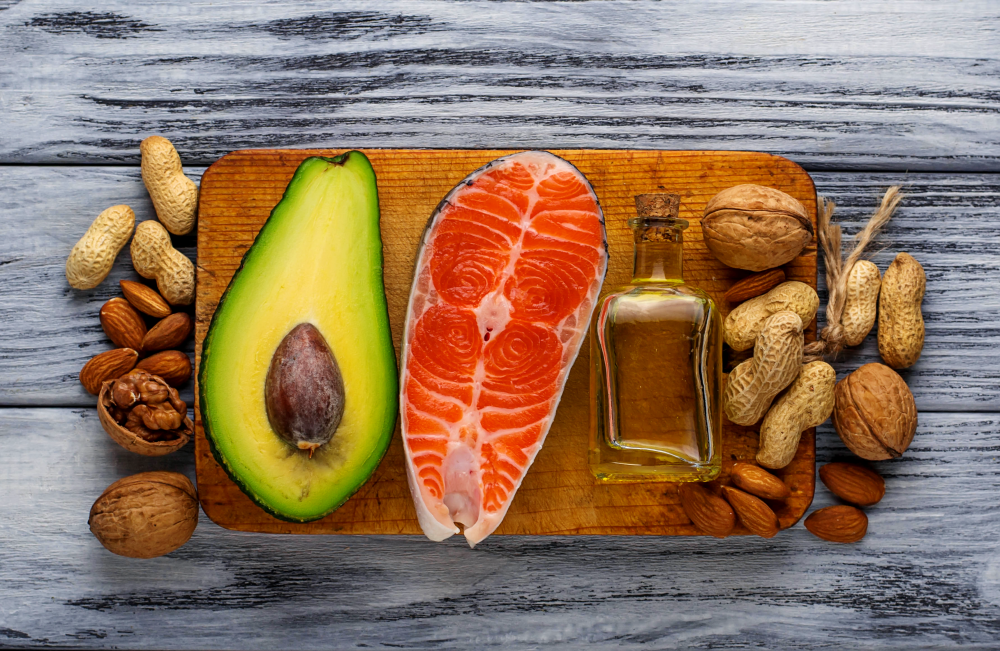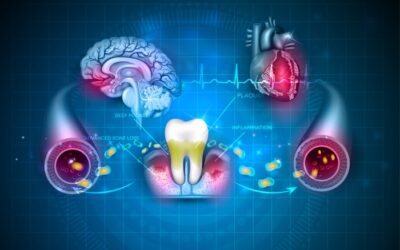Fat is one of three macronutrients found in food that is essential for cell survival in humans. However, it is often demonized as being “unhealthy”. But that couldn’t be further from the truth. Some fats have been linked to improved cognition and decreasing the risk of neurodegenerative disease. With that said, not all fat is created equal. There are two main fat groups.
Saturated fats are found in meat and dairy and unsaturated fats found in vegetable oils, nuts, and fish. Some saturated fats can be harmful if consumed in large amounts. On the other hand, unsaturated fats have significantly greater health benefits.
In this article, you will learn the difference between saturated and unsaturated fats, and how to select the best foods to get the maximum health benefits.
Health Benefits of Dietary Fats
Fat, also called triglycerides, have a number of health benefits.
- Energy: Fats are used for energy once glucose in the blood is depleted. Excess fat gets stored in the fat cells and in the liver. Fat provides 9 calories/ gram and therefore is a more concentrated source of energy compared to carbohydrates and protein (which provide 4 calories/gram). They are an important source of fuel for the body, especially during prolonged exercise or when carbohydrate stores are low.
- Nutrient absorption: Fats are necessary for the absorption of fat-soluble vitamins (A, D, E, and K) and other important nutrients such as carotenoids.
- Hormone production: Fats are essential for the production of hormones, including sex hormones and adrenal hormones.
- Cell membrane structure: Fats are a major component of cell membranes, helping to maintain their structure and function.
- Brain function: Fats are important for brain function, as the brain is composed of about 60% fat. Adequate intake of omega-3 fatty acids, in particular, has been linked to improved cognitive function and a reduced risk of dementia.
- Skin health: Fats are important for maintaining healthy skin, as they help to keep it moisturized and supple.
But as stated earlier, not all fats are created equal, and some types of fats can have negative health effects.
Harms associated with trans fatty acids (trans fat)
Trans fats, also known as partially hydrogenated vegetable oil is far more harmful than saturated fats. The most common type of trans fat is man-made. It’s created through a manufacturing process called hydrogenation and is used to extend the shelf life of food products.
Trans fats are known to:
- Increase LDL cholesterol (bad cholesterol) and decrease HDL cholesterol (good cholesterol) in the blood
- Impair insulin sensitivity: Trans fats may impair insulin sensitivity, which can increase the risk of type 2 diabetes.
- Harmful effects on the brain: Trans fats have been linked to cognitive decline and an increased risk of Alzheimer’s disease.
- No nutritional value: Trans fats provide no nutritional value and are not essential for health.
- Increase inflammation: Trans fats can increase inflammation in the body, which is linked to a variety of health problems, including heart disease, diabetes, and cancer.
The good news is that these fats are so bad they have been ban in most countries. However, there is a little loop hole in the “rules” and if there is less than 0.5 grams/serving, food manufacturers can put “0 grams” on the label.
That said, it is important to recognize the types of foods that may contain these harmful fats and make the effort to avoid them.
Foods that contain potentially harmful amounts of trans fats
- Fast foods—including tater tots, and French fries
- Most spreads—such as margarine spreads or peanut butter
- Snack foods—such as chips, crackers, and cookies
- Fried foods—including fried chicken, onion rings, and nuggets
- Nondairy creamer
- Pre-prepared cake frostings
- Vegetable shortening
- Commercially pre-prepared products, such as pie crusts, pizza dough, and cookie dough
- Pastries, donuts, and pies
“Healthy Fats”
Healthy fats are types of fats that provide important health benefits.
Here are some examples of healthy fats:
Monounsaturated fats
These fats are found in foods such as olive oil, avocados, nuts (such as almonds, cashews, and peanuts), and seeds (such as pumpkin and sesame seeds). They can help to lower LDL (bad) cholesterol levels and reduce the risk of heart disease.
Polyunsaturated fats
These fats are found in foods such as fatty fish (such as salmon, mackerel, and sardines), flaxseeds, chia seeds, and walnuts. They are important for brain function and can help to reduce inflammation in the body.
Omega-3 fatty acids
These are a type of polyunsaturated fat that are particularly important for heart health and brain function. They are found in fatty fish, flaxseeds, chia seeds, and walnuts.
Saturated fats
While saturated fats have been traditionally considered unhealthy, recent research suggests that some types of saturated fats (such as those found in coconut oil and grass-fed butter) may have health benefits when consumed in moderation.
It’s important to note that all fats are high in calories, so it’s important to consume them in moderation as part of a balanced diet. Aim to replace unhealthy fats (such as trans fats and saturated fats from processed foods) with healthy fats from whole foods.
Other articles you may be interested in:
Good, Evil,….. and Justice
I believe the hardest thing a human can do is to radically accept unfavorable circumstances. Maybe it's just me, but there is something deep inside every human that craves justice. Not just for ourselves, but for the world. Webster tells me that the definition of...
Exploring the Connection Between Sleep and Weight Loss
An estimated 50 to 70 million people in the U.S. are battling chronic insomnia and sleep disorders. These seemingly harmless conditions brought on by stress, changes in sleep schedules or lifestyles, and medications can be quite disruptive. Over time, it can lead to...
Soothing Stress With Sound Therapy
Seventy-six percent of U.S. adults reported that they experienced at least one symptom of stress in the last month such as headaches, fatigue, nervousness, anxiety, depression, and sadness. It’s easy to see why. Americans are among the most stressed out people in the...
12 Clever Ways To Healthy Eating on a Budget
Inflation and supply-chain disruptions have caused food prices to shoot up more quickly than in previous decades, making every trip to the grocery a costly and tricky affair. Despite the fact that food has become more expensive than ever, the federal minimum wage...
Volunteering: How Helping Others May Impact Overall Health
Volunteering is a pro-social behavior. It’s dedicating your time, attention, and resources toward helping people who are facing hardships in your community with no expectation of any reward or compensation. But there is something in it for you after all. Volunteering...
The Unseen Connection: Oral Health’s Surprising Impact on Heart Health
Did you know that the benefits of maintaining oral health go beyond your mouth? Oral health—the health of your teeth, gums, alveolar bone, etc.—plays a more significant role than you think. Sure, it keeps your gums and teeth clean and healthy. It also helps with basic...
Whispers to Wonders: Unraveling the allure of ASMR
You may have come across the term “ASMR” at least once, particularly if you’ve been on certain corners of social media. Be it TikTok, Instagram, or even YouTube, ASMR videos have been all the rage. Tapping, scratching, whispering, chewing—ASMR (autonomous sensory...
Mind Your Memory: Naturally Nurturing Your Cognitive Strength
Your memory is an intricate tapestry woven with knowledge, experience, and personal history, which forms the cornerstone of human cognition. However, as is the case with any tapestry, your memory will start to wear out with time, and your cognitive health may decline...
Silent Storms: The Atypical Form of Depression You Need to Know More About
Approximately 280 million people suffer from depression on a global scale. The figure is harrowing but doesn’t give you the complete picture because depression isn’t always visible. Sometimes, people experience symptoms related to it but can’t pinpoint what they’re...
Understanding The Link Between L-Theanine and Stress
Introduction Today, stress is one of the leading causes of physical challenges. Yes, what used to be a feeling of tension or a state of mind when faced with a difficult situation can impact you physically and even how you react and handle things emotionally and...











